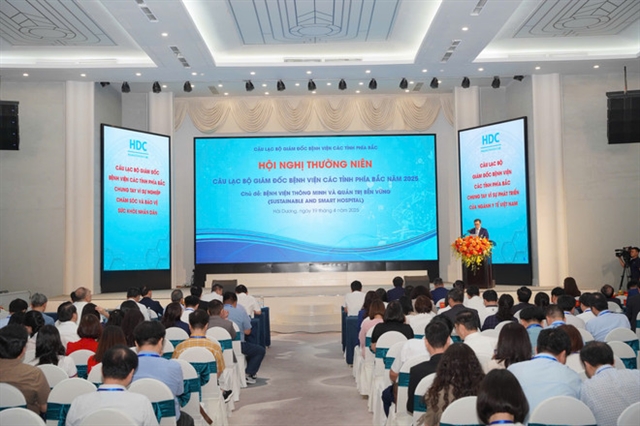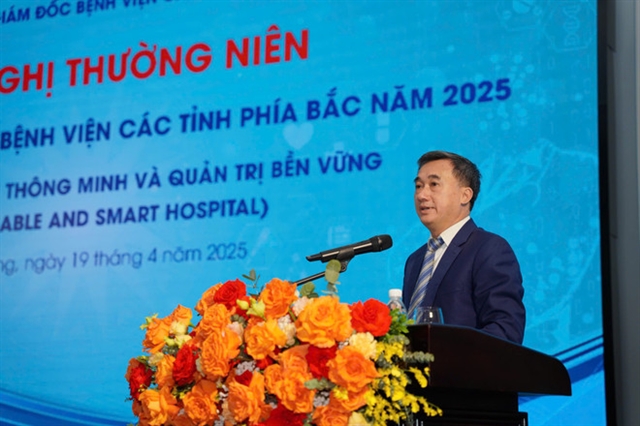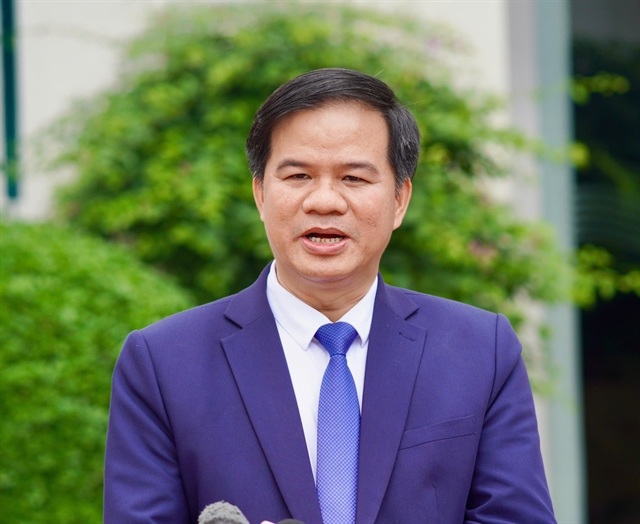 Economy
Economy

 |
| Participants attend the annual conference of hospital directors in Hải Dương Province on April 18-19. — VNS Photo Thanh Hải |
by Thanh Hải
HẢI DƯƠNG — 'Smart and Sustainable Hospitals' was the main topic of discussion at the annual conference of hospital directors in the northern provinces, which took place in Hải Dương on April 18 and 19.
With a focus on patient-centred care, the meeting aimed to bring satisfaction, safety and the best medical services to patients, meeting people's medical examination and treatment needs.
Speaking at the event, Deputy Minister of Health Trần Văn Thuấn asked hospitals to apply the digital transformation, operate transparently and effectively in real time, and build smart hospitals with patients at the centre.
“The health sector needs to effectively utilise all resources from the State budget, health insurance, public-private partnership and socialisation to increase investment in grassroots health care, ensuring that people in all regions have access to essential, high quality and safe health services. All aim to ensure that every citizen receives a regular health check-up every year, gradually moving towards the extremely humane and noble goal of free hospitalisation for all people according to the policies and directions of the Party and State leaders."
 |
| Deputy Minister of Health Trần Văn Thuấn speaks at the annual conference of hospital directors in the northern province of Hải Dương on April 18-19. — VNS Photo Thanh Hải |
Thuấn said that in recent years, the hospital system nationwide has made many changes in management, improving both service quality and the application of technology, but there are still many shortcomings. Although bidding and procurement of drugs and medical equipment have improved, there are still places where there is a shortage of drugs and supplies, affecting professional activities. The financial mechanism and implementation of autonomy are still inadequate. Some units face many difficulties in balancing finances.
In addition, the current health insurance payment mechanism, technical and economic norms and service price framework are not suitable for the actual costs incurred at hospitals. In many hospitals, the digital transformation has achieved initial results, but implementation is uneven, and there is a lack of skilled workers, according to Thuấn.
“The Ministry of Health therefore requests hospitals to rapidly apply the digital transformation, operate transparently and effectively in real time, build smart hospitals with patients at the centre, and consider patient safety and life as a top priority,” said Thuấn.
To improve the quality of medical examinations, Thuấn suggested that hospitals need to innovate their hospital management mindset, including with an extensive application of technology in management, operation and expertise.
Thuấn said: "Hospitals need to promote the implementation of electronic medical records, electronic health records, quality management systems and interconnection between facilities, as well as move towards building a smart hospital model, meeting real-time management requirements and focusing on patients.
"Upper-level hospitals should increase professional support, on-site training and apply information technology in remote consultation and treatment, while expanding the satellite hospital model in a sustainable manner, linked to the practical needs and reception capacity of each facility.”
 |
| Director of Bạch Mai Hospital and Chairman of the Club of Hospital Directors of the Northern Provinces Associate Professor Đào Xuân Cơ. — VNS Photo Thanh Hải |
Director of Bạch Mai Hospital and Chairman of the Club of Hospital Directors of the Northern Provinces, Associate Professor Đào Xuân Cơ said that the health sector is entering a period of development that is full of potential, but that also holds many challenges.
“In addition to the continuous efforts in medical examination and treatment, hospitals identify science, technology and innovation as the key to improving the quality of medical services, better meeting the diverse health care needs of the people.
In particular, the Government's Project 06 on the digital transformation has pushed the healthcare sector to make breakthroughs in applying information technology, from digitising the entire medical examination and treatment process and connecting medical data, to applying artificial intelligence in diagnosis and treatment,” said Cơ.
According to Cơ, digital transformation brings four major benefits, including improving the quality of medical examination and treatment thanks to electronic medical records; optimising medical examination and treatment processes, saving nearly VNĐ80 billion yearly by eliminating paperwork; improving patient experience through online services; and promoting research and application of artificial intelligence, such as the AI system for diagnosing lung cancer from CT images and histopathology developed by the hospital.
Many large hospitals, such as Bạch Mai, Chợ Rẫy and 108 Military Central Hospital, have taken the lead in digital transformation by using electronic medical records, improving health checkup and treatment processes and enhancing professional ethics.
Bạch Mai Hospital has switched to completely electronic medical records since November 2024 and successfully deployed the "Bạch Mai Care" application to help patients look up information and medical examination history.
Bạch Mai Hospital also implemented a streamlined management project, standardised processes, optimised costs and worked with many partners to develop a green, environmentally friendly hospital model.
Dr Cơ stressed that building smart hospitals and sustainable management is not only to increase internal efficiency but also to narrow the healthcare gap between regions, aiming for a universal, personalised and humane healthcare system.
 |
| Medical Services Administration director Hà Anh Đức. — VNS Photo Thanh Hải |
Regarding the implementation of electronic medical records, Director of the health ministry’s Medical Services Administration (MSA) Hà Anh Đức said that the agency has recently advised the leaders of the Ministry of Health to promulgate documents on the list of inter-clinical tests with identification codes for each hospital.
“These lists all meet more than 90 per cent of international standards. This is the first guarantee for data interconnection nationwide. When this list is available, medical facilities will apply electronic medical records more conveniently,” said Đức.
Regarding the list of clinical tests and hundreds of other categories, the MSA will submit these categories by the end of May to gradually ensure the feasibility of the roadmap for implementing electronic medical records, according to the MSA director. — VNS




